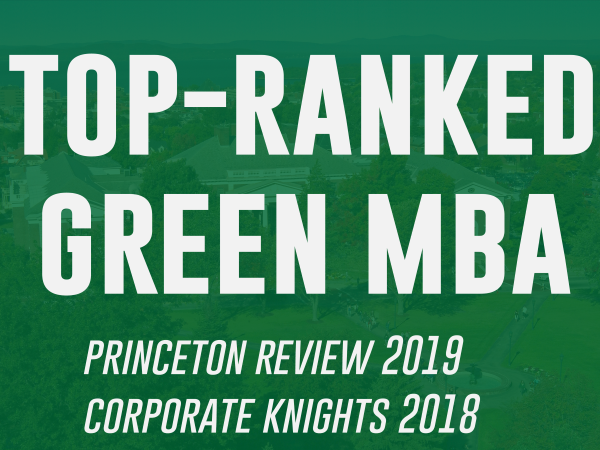Over the past 25 years, most major business schools in the world have added some kind of initiative, center, or program focused on sustainability, corporate citizenship, or social entrepreneurship. The problem is that virtually all of these initiatives, centers, or programs tend to hang off the side of the existing business school edifice. Like the proverbial "saddle bag" on a horse, the issues are contained within separate compartments that are readily visible from the outside, but have little impact on the behavior of the animal itself. Sustainability has joined other business school "saddle bag" issues such as ethics, entrepreneurship, and emerging economies, as a way to recognize, but stop short of fully integrating them into the core DNA of the institutions.
It is high time to move beyond saddle bag sustainability in business education. The social and environmental challenges we face call for nothing less. That is why The Sustainable Innovation MBA curriculum is so unique and important: It seeks to fundamentally reinvent business education and the MBA degree to address the challenges we face in the 21st century-environment, ethics, entrepreneurship, poverty, and inequality. With The Sustainable Innovation MBA, we have taken off the saddle bags and designed a new horse. The curriculum is new and focused 100% on sustainable innovation.
OUR CAMPUS, RESEARCH INSTITUTE, & OTHER PARTNERS:
We proudly partner and collaborate with other UVM centers, institutes, programs, and student organizations across campus to co-create forums and events that enable rich discussion, learning, and exposure to diverse perspectives. Working with partners that include the Gund Institute for the Environment, the Center for Cultural Pluralism, the Family Business Institute, the Institute for Energy and the Environment, the ENACTUS club, the Women and Gender Equity center, and the Women in Business Club (among others), we create opportunities for our students to “cross fertilize,” interact with, and learn from others on campus via research endeavors, workshops, lectures, case competitions, and other collaborative events. Our students have also taken the lead in organizing and delivering such events through our SIMBA Net Impact Chapter that was founded by the Class of 2017.
Our graduates also engage with current students and pursue social justice in the business community through The Sustainable Innovation MBA Women’s Group, which was founded in summer 2018 as an UVM Alumni Association Affinity group. This group of talented alumni strives to create a business environment that values female leaders as a pivotal element of a more sustainable and equitable future. The group endeavors to achieve its vision by connecting members of current and previous cohorts through networking events and workshops, and by providing mentorship to women, engaging in deeper conversations regarding women in business and leadership, and building a network of strong women and leaders in business in Burlington, Vermont and beyond.
Several professors who teach in The Sustainable Innovation MBA program also engage in scholarly pursuits with our Center and Institute partners. Professors Stuart Hart and Tom Noordewier both serve as Gund Research Fellows. In addition, Hart serves on the Gund Institute’s Steering Committee which is focused on helping identify the critical environmental and sustainable development challenges on which to focus interdisciplinary research attention. Professor Dita Sharma serves as the Editor of the Family Business Review—the leading scholarly journal in the field—and collaborates closely with other faculty to study the emerging and important connections between family business and sustainability. Professor Erik Monsen collaborates with Corine Farwell (Director, Office of Technology Commercialization) on both teaching as well as technology commercialization events and initiatives in collaboration with the ENACTUS student club. Professor Kevin Jones serves as Deputy Director at the Institute for Energy and the Environment, and he embeds the Institute’s work within the course he teaches on Sustainable Energy Technology and Policy.
The Grossman School of Business is also a proud signatory to the UN’s Principles for Responsible Management Education (PRIME), and our MBA program enacts and advances its six principles each and every day.


